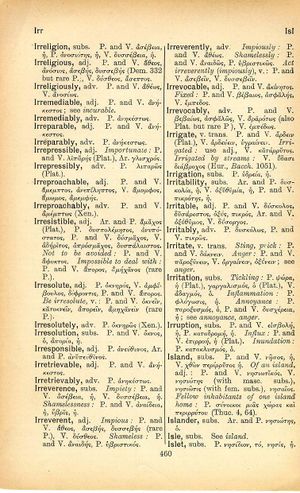irritate: Difference between revisions
From LSJ
Ζευχθεὶς γάμοισιν οὐκέτ' ἔστ' ἐλεύθερος → Haud liber ultra est, nuptiae quem vinciunt → Wer durch der Ehe Joch vereint, ist nicht mehr frei
m (Text replacement - "link={{" to "link={{") |
m (Text replacement - "(|thumb)\n(\|link=)" to "$1$2") |
||
| Line 1: | Line 1: | ||
{{Woodhouse1 | {{Woodhouse1 | ||
|Text=[[File:woodhouse_460.jpg|thumb | |Text=[[File:woodhouse_460.jpg|thumb|link={{filepath:woodhouse_460.jpg}}]]'''v. trans.''' | ||
|link={{filepath:woodhouse_460.jpg}}]]'''v. trans.''' | |||
<b class="b2">Sting, prick</b>: P. and V. δάκνειν. | <b class="b2">Sting, prick</b>: P. and V. δάκνειν. | ||
<b class="b2">Anger</b>: P. and V. παροξύνειν, V. ὀργαίνειν, ὀξύνειν; see [[anger]]. | <b class="b2">Anger</b>: P. and V. παροξύνειν, V. ὀργαίνειν, ὀξύνειν; see [[anger]]. | ||

